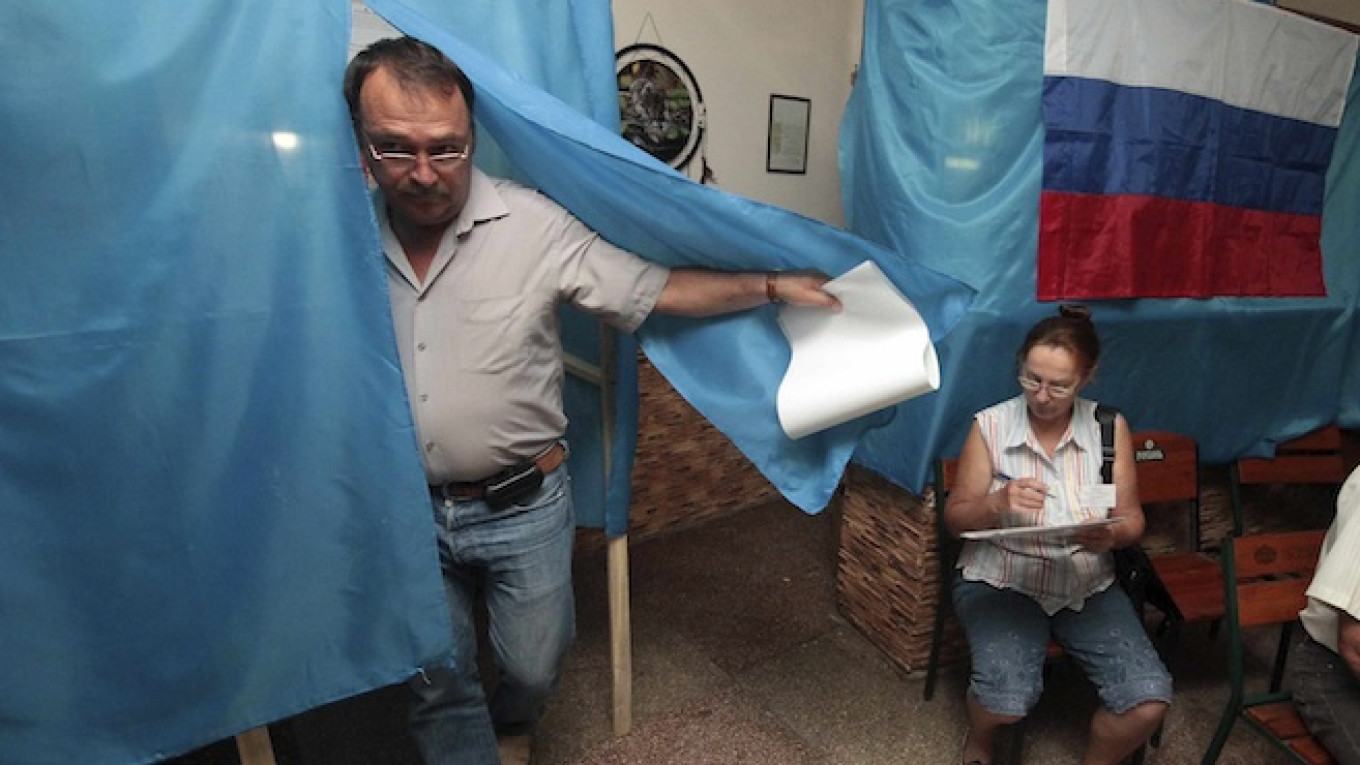Six months after Russia annexed Crimea, residents of the Black Sea peninsula cast their first votes in a Russian election — an election many of them are calling unfair and undemocratic.
Campaigning before Sunday's local and regional elections was characterised by favoritism towards the ruling party loyal to Russian President Vladimir Putin and repression of its opponents, according to residents in Crimea who spoke by telephone.
Crimean politics has come to resemble the Soviet political landscape since Russia annexed Crimea in March, said Andrei Brezhnev, who leads new Communist Party of Social Justice, and is the grandson of the Soviet leader Leonid Brezhnev.
"Now we have no political competition either," he said.
His party is competing in the regional parliamentary race and in a poll for one of the main cities, Sevastopol. People had been forced to sign up for membership in the pro-Putin United Russia Party before the vote, he said.
"About two months ago everybody, wholesale, was forced to 'voluntarily' sign up for membership in United Russia here — officials, heads of local administrations, shops directors, medical workers," he said. "Suddenly, in three months, everything became United Russia here."
United Russia's victory in a parliamentary election in 2011 sparked accusations of voting violations and launched the biggest anti-Putin street protests in his more than decade-long rule.
Crimea, facing water and electricity shortages following its annexation by Russia, is also seeing a rise in probable politically motivated human rights violations, a top European rights envoy said Friday.
Nils Muiznieks, commissioner for human rights at the Council of Europe, also said pressure has increased on ethnic Crimean Tatars, a Muslim ethnic minority, who are facing raids on their businesses and schools.
Nariman Dzhelyalov, a local politician, who represents Crimean Tatars, said the Tatar community assembly he sits on had called for a boycott of the vote.
"There are no opposition parties. All the parties here are pro-Kremlin, pro-Putin. All of them support his policy, all of them love him," said Dzhelyalov.
"We called all the citizens of Crimea regardless of their ethnicity not to take part in those elections," he said. "We believe voting legislation does not give the indigenous population of Crimea an opportunity to be represented in elected government bodies appropriately."
Vladimir Konstantinov, the speaker of State Council of Crimea, now from United Russia, said last month that no intense political battle was going on in the territory.
"Between competitors, there is no fight to defeat one another. Compared to our recent elections, [campaigns] are exemplary," he told state news agency RIA Novosti.
A Russian state television reporter said that "everything was running smoothly" at Crimean polling stations in Crimea.
But independent vote monitor Golos said their observers were prevented from entering several polling stations, Russian news wires reported. Elections are being carried out in 84 of the 85 country's regions, state television channel Russia 24 said.
A Message from The Moscow Times:
Dear readers,
We are facing unprecedented challenges. Russia's Prosecutor General's Office has designated The Moscow Times as an "undesirable" organization, criminalizing our work and putting our staff at risk of prosecution. This follows our earlier unjust labeling as a "foreign agent."
These actions are direct attempts to silence independent journalism in Russia. The authorities claim our work "discredits the decisions of the Russian leadership." We see things differently: we strive to provide accurate, unbiased reporting on Russia.
We, the journalists of The Moscow Times, refuse to be silenced. But to continue our work, we need your help.
Your support, no matter how small, makes a world of difference. If you can, please support us monthly starting from just $2. It's quick to set up, and every contribution makes a significant impact.
By supporting The Moscow Times, you're defending open, independent journalism in the face of repression. Thank you for standing with us.
Remind me later.


